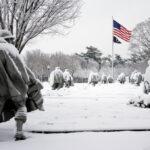
Yet it is worth a moment to pause and do the opposite: to reflect on what has changed despite our return to a state that would have seemed blessedly normal three years ago.
Each summer, War Room takes a brief two-week pause in publication. Typically, we note the break with nothing more than a short blurb in the weekly wrap-up e-mail. Three years ago, however, the editor-in-chief at the time—the redoubtable Jacqueline Whitt—wrote a full editorial to announce that year’s War Room “staycation.”
Looking back at her words from June 2020, I am struck by the surprisingly up-beat tone despite all of the turmoil occurring at the time and the uncertainty about what lay ahead. To be certain, there is a muted tone of uncertainty lurking below the surface in her note. On the balance, however, it is an excellent example of stay-the-course leadership as she noted much of what was remaining the same.
Yet it is worth a moment to pause and do the opposite: to reflect on what has changed despite our return to a state that would have seemed blessedly normal three years ago.
As Whitt noted, even in 2020 the July pause did not mean the War Room offices went dark. Plenty of work did and still does go on during the publication holiday. What is different is the pandemic has emphatically destroyed the quaint notion that there are some physical War Room offices with an actual light to be switched off. Virtually all of our editorial collaboration takes place on Teams, and the majority of podcast episodes are recorded from distributed locations. This has some benefits. Our editorial processes have greater resilience, allowing things to continue irrespective of work trips, family vacations, and personal emergencies. It also allows us to maintain some of our best talent. This year, associate editors Andrew Bell and Justin Magula join Amanda Cronkhite and Jackie Whitt as editors-in-non-residence. We are thankful they chose to stay on the team despite their departures from the Carlisle area. Certainly, the greatest advantage of the shift to virtual collaboration is the enormous increase in potential podcast guests that comes from being unshackled from the requirement to have guest, host, and managing editor in the same room.
Yet in most things the changes are not so clearly good or bad. They just are, and we must each make of them what we will. This editorial began on a porch in coastal Maine during a family vacation. Undoubtedly, the line between work and home has blurred for many of our readers and listeners as well. Rather than trying to tally a list of discrete items that are either “better” or “worse” for the change, it seems more useful (and closer to the truth) to observe simply that the experience of both work and home is now different. Similarly, though the editorial staff is in constant contact, we rarely are physically together. At the time of writing, there is an entertaining dialogue, liberally punctuated by memes and video clips, among the managing editor, podcast editor, and editor-in-chief, even though two are on leave and one is working full-time from home. Once again, labels of “better” or “worse” seem not only inadequate, but also miss the larger point. Things are just different.
In that spirit of looking ahead and taking what comes, the War Room editorial team moves forward into a pseudo-break in which the gears will continue to grind. We look forward to sharing some of the excellent content (as well as other changes) with you in the back half of 2023.
Until then, here are a few of our staff suggestions of our and other producers’ content to tide you over.
Some suggested reading:
- Late last year, we published Wilfrid Greaves’s thoughts on how to eventually reintegrate Russia into the future world order. Though the article views the issue through the lens of the Arctic, the broader issues are particularly pertinent in light of recent events.
- Speaking of Russia, Jack Watling and Nick Reynolds of the UK’s Royal United Services Institute recently published a fascinating report examining how the Russian armed forces have evolved over the first year of conflict.
Some suggested listening:
- A bit hot for you? How about hitching a ride with the Army War College’s Michele Devlin to Antarctica?
- Looking for a good beach read? Major General Mick Ryan (Australian Army, Retired) discusses his new military techno-thriller, White Sun War, a speculation as to how a future war over Taiwan might unfold.
- Twenty years after the “Thunder Run” into Baghdad by 2nd Brigade, 3rd Infantry Division, this Modern War Institute podcast provides a perspective of those events rarely heard—that of the family at home.
- Finally, in late 2022, Ron Granieri had the opportunity to sit down with Lt Gen Sir Rupert Smith (British Army, Retired) and LTG James Dubik (US Army, Retired) for a wide-ranging discussion of war, policy, and society.
We’ll be back on 18 July!
JP Clark is an associate professor of military strategy teaching in the Basic Strategic Art Program. He served in the army for twenty-six years as an armor officer and strategist. He holds a Ph.D. and M.A. in history from Duke University, an M.S.S. from the Army War College, and a B.S. in Russian and German from West Point. He is the author of Preparing for War: The Emergence of the Modern U.S. Army, 1815-1917 (Harvard, 2017). He is currently working on a history of U.S. military strategy in the Pacific from 1898 to 1941 that is under contract with the University Press of Kansas. He is the 3rd Editor-in-Chief of War Room.
The views expressed in this article are those of the author and do not necessarily reflect those of the U.S. Army War College, the U.S. Army, or the Department of Defense.
Photo Description: The author’s view while composing this article
Photo Credit: Photo courtesy of J.P. Clark





Let’s consider being “back to normal” from the perspective of the “normal”(?) clash between civilizational society and market society described in the three quoted items below:
“In this new world disorder, the power of identity politics can no longer be denied. Western elites believed that in the twenty-first century, cosmopolitanism and globalism would triumph over atavism and tribal loyalties. They failed to understand the deep roots of identity politics in the human psyche and the necessity for those roots to find political expression in both foreign and domestic policy arenas. And they failed to understand that the very forces of economic and social development that cosmopolitanism and globalization fostered would generate turbulence and eventually resistance, as ‘Gemeinschaft’ (community) fought back against the onrushing ‘Gesellschaft’ (market society), in the classic terms sociologists favored a century ago.”
(See the Mar-Apr 2017 edition of “Foreign Affairs” and, therein, the article by Walter Russell Mead entitled “The Jacksonian Revolt: American Populism and the Liberal Order.”)
“Abstract: The outbreak of the First World War remains a great historical puzzle and a source of concern, for if we do not understand how it came about we run the risk of stumbling into a similar catastrophe. This article draws parallels between the world of 1914 and the present. It starts with comfortable assumptions made by so many, then and now, that a major conflict was impossible or improbable and then looks at the paradox that globalization not only made the world more interdependent and linked, but also fostered intense local and national identities. It suggests factors that propelled Europe to war in 1914, including national rivalries, imperialism, the arms race and a shifting power balance between rising and declining powers, as well as ideologies and assumptions such as Social Darwinism and militarism, and points out that similar forces and ideas are present today. …”
(See the Margaret MacMillian “International Affairs” article “1914 and 2014: Should We be Worried?”)
“Yet, as noted by scholars across different theoretical traditions, the liberal international order is not simply a normatively thin order that regulates in mutually beneficial ways relations among states through value-free rules, institutions, and markets. It is rather an ideologically thick order (Allan, Vucetic, and Hopf 2018; Jahn 2019; Cooley and Nexon 2020), infused with a complex set of ideas, norms and principles, whose main institutions, actors, and practices seek to transform states and their societies both beyond and within the West.”
(See the article “Civilizationism and the Ideological Contestation of the Liberal International Order” by Gregorio Bettiza, Derek Bolton, David Lewis in “International Studies Review,” Volume 25, Issue 2, June 2023.)
Herein, it is important to note that — much as in earlier times — this IS NOT a “West v. the Rest” “return to normal” conflict phenomenon; this, given that — as noted in the last quoted item above — in both such cases, the liberal international order “seeks to transform states and their societies both beyond and within the West.”
(Do nations such as China seek to gain power, influence and control — both here in the U.S./the West and elsewhere throughout the world — this, by [a] embracing such things as “civilizationalism” and [b] attacking such things as “market society” and the liberal international order?” In this regard, consider China’s new “Global Civilizational Initiative.”)
Question — based on my initial comment above:
If, as noted in my initial comment above (see the last quoted item therein) the capitalism, markets and trade-oriented liberal international order is (a) “an ideologically thick order,” (b) “infused with a complex set of ideas, norms and principles,” (c) “whose main institutions, actors and practices seek to transform states and their societies both beyond and within the West,”
And if, accordingly, such things as “civilizationism” (as embraced by actors both within and beyond the West) can be seen as the ideological opponent of this such “transformative” liberal international order,
Then, in circumstances such as these (which indeed might be considered as a “return to normal”?), how might this such conflict effect such things as:
a. The — contested — mobilization and deployment of our military forces; military forces who are mobilized and deployed in the name of maintaining and/or achieving the “transformative” goals of the liberal international order? And:
b. The public trust and faith in our military — and in many of our other governmental agencies; governmental agencies whose duties and responsibilities have become to maintain and/or to achieve (both here at home and there abroad) the “transformative” goals of the liberal international order?